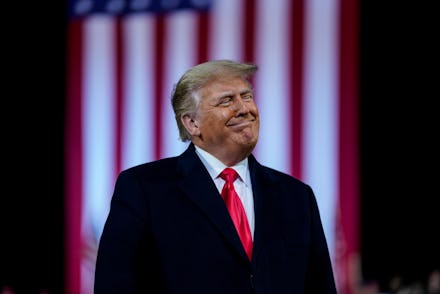Trump just vetoed the National Defense Authorization Act over Confederate military bases and mean tweets

In a rare instance of being true to his word, President Donald Trump on Wednesday followed through on his longstanding threat to veto this year's National Defense Authorization Act. In doing so, he called the bill — which funds the Pentagon and is responsible for, among other things, military paychecks to the troops he so often lauds — a "'gift' to China and Russia."
"I will not approve this bill, which would put the interests of the Washington D.C. establishment over those of the American people," Trump wrote in a statement to the House of Representatives, which passed the $740 billion NDAA with a veto-proof majority of 335-78 earlier this month. It passed the Senate by a similarly overwhelming margin of 84-13 shortly thereafter.
Chief among Trump's problems with the annual bill, which has been passed without incident for more than half a century, is the fact that it does not repeal Section 230 of the Communications Decency Act, designed to provide legal cover for social media platforms in regards to the 3rd party content they host. Earlier this month Trump repeatedly demanded (on Twitter no less) that the NDAA eliminate Section 230, which he has described as "a National Security and Election Integrity MUST," but which also happens to play heavily into his ongoing love-hate relationship with the social media giants that both helped create his public persona, and which are frequently relied upon by users to mock and oppose him.
Trump also stated in his letter to the House that he opposed the NDAA's "language that would require the renaming of certain military instillations" — a benign-sounding gripe, until you realize he is referring to efforts to strip the names of Confederate officials who literally rebelled against the United States from current military sites. Trump has repeatedly praised Confederate General Robert E. Lee, and monuments named for other Confederate figures, in the past.
Lawmakers are expected to return to Congress after Christmas, in order to vote to override the president's veto. However, despite the wide margin with which the NDAA initially passed in the Senate, there is some indication that things could be considerably closer this time around.
House Minority Leader Kevin McCarthy has similarly said that despite having voted for the NDAA before, he would not work to override Trump's veto if the bill was returned to the House.
House Speaker Nancy Pelosi, meanwhile, responded to Trump's announcement by calling it an "act of staggering recklessness that harms our troops, endangers our security and undermines the will of the bipartisan Congress."
This is the second time in as many days that Trump has fully derailed a bipartisan congressional arrangement. On Tuesday evening the president surprised Republicans by publicly demanding that the $600 direct payments agreed upon with Democrats in the tenuously negotiated COVID relief bill be upped to at least $2,000 per person.